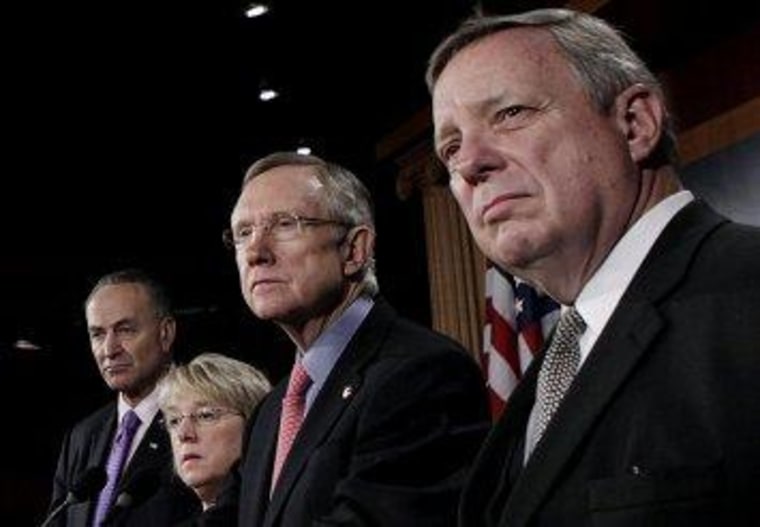Senate Majority Leader Harry Reid (D-Nev.) has, on more than one occasion, threatened high-profile showdowns over filibuster abuses, only to back off in the end. And so, as talk of the "nuclear option" becomes more common, even reform proponents are skeptical about whether Reid will follow through on the aggressive, confrontational tactic.
We'll know more as the summer progresses about Reid's true intentions, but in the interim, there are two broad angles to keep in mind. The first is whether the Majority Leader actually has the votes to successfully pull off the nuclear option.
The Senate Democratic caucus has 55 members (53 Democrats and 2 independents), and to execute this strategy, he'll need 51 votes, which may or may not exist. There is, to be sure, widespread frustration among Democratic senators with the unprecedented Republican abuses, but several senators -- including Carl Levin (D-Mich.), Jack Reed (D-R.I.), Mark Pryor (D-Ark.), and Max Baucus (D-Mont.) -- have recommended caution before making a change that would likely change the chamber for the indefinite future.
Reid will reportedly lobby his members over the next several weeks, but whether the majority will materialize remains to be seen. Those assuming Senate Dems have the votes lined up to execute this plan appear to be mistaken, at least for now.
And this leads to the second angle: whether the Democratic majority has been left with much of a choice. Norm Ornstein, a respected political scientist and non-partisan scholar at the American Enterprise Institute, argued yesterday that the nuclear option "could be dangerous," but Senate Republicans "have left few alternatives" with their relentless obstructionism (via Greg Sargent).
I remain deeply uneasy about a nuclear option, even as I condemn the unprecedented obstructionist tactics employed in the Senate (which were also condemned last week by Bob Dole and lamented by John McCain) and call for deeper reforms, especially on nominations, in Senate rules. The fallout from such a move is unknown but would be substantial and deleterious. It would be far better to return to regular order, and to the use of filibusters as rare events, not routine ones.But if senators who know better -- like Lamar Alexander, Bob Corker, Susan Collins, Lindsey Graham, and Saxby Chambliss -- jump when McConnell tells them and continue to obstruct nominations, they should expect to reap the whirlwind. And they, and their colleagues, will be the ones responsible for the damage done.
That last point is of particular significance.
If and when Senate Democrats decide to seriously pursue a change that would eliminate filibusters on judicial and administration nominees, Republicans will be apoplectic. But Ornstein's point is important: this is ultimately the Senate GOP's fault; they're the ones who created the crisis that the nuclear option is intended to resolve.
Think about what Republicans are effectively arguing: "We demand the right to, for the first time in American history, use our minority status to block cabinet nominees and judicial nominees from confirmation votes with no reason ... and we demand that the Senate majority do absolutely nothing about it except indulge our obstructionist impulses."
Many will argue that Dems fiercely opposed the nuclear option when it was a Republican idea in 2005 -- and those critics will be correct. But context matters, and Senate filibusters and obstructionist tactics are far worse now than they were eight years ago, making the need for change more acute.
And at this point, what choice do Democrats have? Put up with an untenable status quo indefinitely? Greg added, "Look, the basic situation here is that Democratic leaders don't want to hit the nuke button.... But if the current levels of obstructionism continue, Reid and fellow Democrats will have no choice but to go through with hitting the nuke button, even against their own will.... This is on Republicans. If Dems end up hitting the nuke button, Republicans will be to blame for it."
